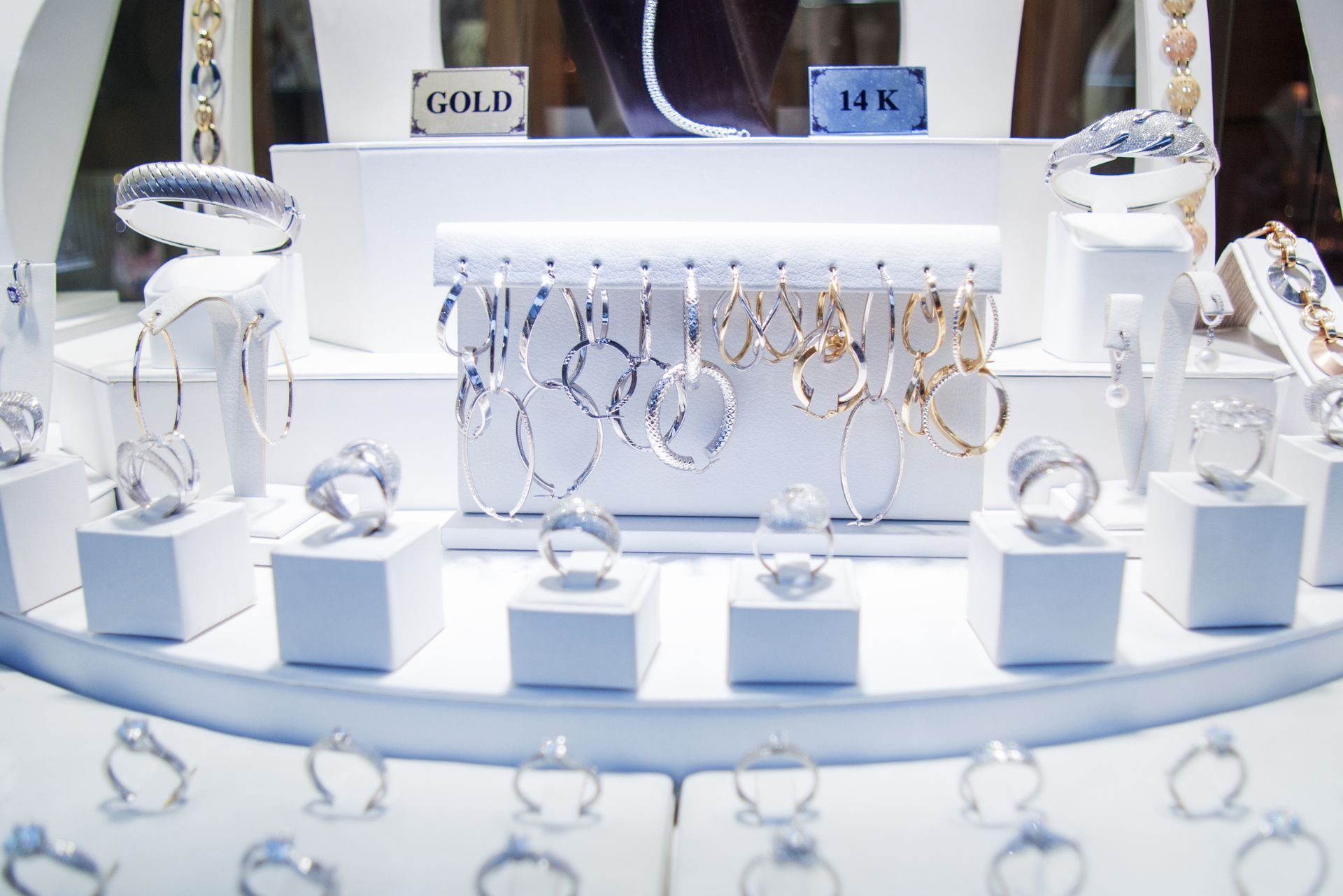
Most Common Business Policies
Index
Understanding the Importance of Jewelry Store Insurance
Types of Insurance Policies for Jewelry Stores in Texas
How to Choose the Right Insurance for Your Jewelry Store
The Cost of Jewelry Store Insurance in Texas
Filing a Claim: What to Expect
Frequently Asked Questions about Jewelry Store Insurance in Texas
Contact Us
Running a jewelry store is both an art and a science, especially when it comes to protecting the valuable items you offer. As much as you focus on design and customer service, ensuring that your business is adequately safeguarded against potential risks is crucial. This guide delves into the importance of jewelry store insurance, the types of policies available, how to choose the right coverage, and much more.
Understanding the Importance of Jewelry Store Insurance
Jewelry store insurance is not just a safety net; it is essential for operating a successful jewelry business. This type of insurance provides a protective barrier against the myriad of risks that jewelers face daily.
Protecting Your Inventory
Your inventory is your most significant asset, and jewelry often comes with a hefty price tag. Insurance can help cover damages or losses due to theft, fire, or natural disasters, ensuring that your investment is safeguarded.
In Texas, where extreme weather can occur, protecting your inventory becomes even more crucial. With the right insurance policy, you can have peace of mind knowing that your beautiful jewelry pieces are protected against unforeseen circumstances. Additionally, many insurance policies offer coverage for items in transit, which is particularly important for jewelers who participate in trade shows or who ship items to customers. This added layer of protection ensures that your merchandise remains secure, whether it’s on your premises or being transported elsewhere.
Safeguarding Your Store
Jewelry stores are often prime targets for burglaries and vandalism. Insurance not only protects your physical inventory but also the store premises. Policies can cover losses incurred from property damage and theft, allowing for repairs or replacements without crippling financial loss.
Moreover, having a secure insurance policy can enhance your store's reputation. Clients are often more likely to trust a jeweler who is insured, knowing that you take their transactions—and your business—seriously. Furthermore, many insurance providers offer risk management resources that can help you implement security measures, such as alarm systems and surveillance cameras, which can further deter criminal activity and protect your assets. Investing in these preventative measures not only secures your store but also demonstrates to your customers that you prioritize their safety and the integrity of your business.
Liability Coverage for Jewelry Businesses
Liability coverage is a critical component of insurance for any business. For jewelry stores, this means being protected against claims that might arise from customer injuries or damages caused by a piece of jewelry sold.
For example, if a customer claims that a ring you sold caused an allergic reaction, liability coverage will help defend against such claims and cover any potential legal costs. This layer of protection is vital in maintaining your business’s reputation and financial stability. Additionally, liability insurance can extend to cover incidents that occur on your premises, such as a customer slipping and falling while browsing your collection. By having comprehensive liability coverage, you not only protect your financial interests but also foster a safe shopping environment that encourages customer loyalty and trust. As a jewelry store owner, being prepared for the unexpected is crucial, and the right insurance policy can provide that necessary reassurance.

Types of Insurance Policies for Jewelry Stores in Texas
Understanding the different types of insurance policies available is crucial for every jewelry store owner. Each policy caters to various aspects of business protection, ensuring comprehensive coverage.
Business Owner's Policy (BOP)
A Business Owner's Policy is a comprehensive insurance plan that combines general liability insurance with property insurance. This package is ideal for jewelry stores, as it provides a broad spectrum of coverage.
BOPs are often more affordable than purchasing each type of coverage separately. They protect against property damage, business interruptions, and liability claims, making them an attractive option for jewelry business owners in Texas. Additionally, many BOPs can be customized to include specific endorsements that cater to the unique needs of jewelry retailers, such as coverage for high-value inventory and specialized equipment used in the crafting and repair of jewelry.
Workers Compensation Insurance
If your jewelry store has employees, workers' compensation insurance is mandatory in Texas. This insurance covers medical expenses and lost wages for employees injured on the job.
By investing in workers' compensation, you not only comply with state laws but also demonstrate a commitment to your employees' wellbeing. This can improve morale and potentially lower turnover rates. Furthermore, having this insurance can protect your business from lawsuits related to workplace injuries, as it provides a no-fault system that benefits both employees and employers, allowing for a smoother resolution of claims.
Commercial Property Insurance
Commercial property insurance specifically protects the physical location of your jewelry store and its contents. This type of policy covers damages incurred from fire, theft, and other disasters.
For jewelers, having commercial property insurance is particularly important due to the high value of the items at risk. You can tailor this policy to include additional protections, such as coverage for special events or exhibitions. Moreover, many insurers offer options for business interruption coverage, which can help mitigate losses in the event that your store is temporarily closed due to a covered incident, ensuring that your operations can resume as quickly as possible.
Professional Liability Insurance
Also known as errors and omissions insurance, this type of policy protects you against claims resulting from negligence, mistakes, or failures to deliver the promised service. For jewelry stores, professional liability insurance can cover claims that arise from the sale of defective products or inadequate services.
By having this insurance, you safeguard your store against legal proceedings that could arise from customer dissatisfaction or disputes, again ensuring that your business maintains its good standing. Additionally, it can also extend to cover issues related to advice given to customers, such as appraisals or recommendations on jewelry care, providing peace of mind that you are protected in all aspects of your service offerings.
How to Choose the Right Insurance for Your Jewelry Store
Choosing the right insurance for your jewelry store is a nuanced decision, and it starts with understanding your specific needs and risks.
Assessing Your Business Risks
Begin by conducting a thorough assessment of your business risks. Identify the key areas where you are most vulnerable—this can include theft, property damage, or liability issues.
Once you understand your risks, you can consult with an insurance professional who specializes in jewelry stores to tailor a policy that meets your needs. They can provide insights into the typical risks faced by similar businesses, guiding you in the right direction.
Additionally, consider the unique aspects of your jewelry store that may influence your risk profile. For instance, if you offer custom jewelry design services, the potential for errors or customer dissatisfaction could introduce liability risks that need to be addressed in your insurance policy. Similarly, if you host events or workshops, the increased foot traffic may elevate your exposure to accidents or injuries, making it crucial to factor these elements into your risk assessment.
Comparing Insurance Providers
The next step is to compare various insurance providers. Look for those that have experience working with jewelry businesses, as they will better understand your needs.
- Check their reputation through online reviews and client testimonials.
- Assess the breadth of coverage they provide.
- Compare pricing and terms of their policies.
Meeting with multiple providers can also give you a sense of the options available, helping you find the best match for your business. During these meetings, inquire about any specialized coverage options that may be beneficial for your store, such as coverage for high-value items, loss of income due to business interruption, or even cyber liability insurance if you conduct transactions online.
Furthermore, don’t overlook the importance of customer service when selecting an insurance provider. A company that is responsive and supportive can make a significant difference when you need to file a claim or seek assistance. Look for providers that offer 24/7 support and a straightforward claims process, as these factors can greatly enhance your experience in times of need.
Understanding Policy Terms and Conditions
Before settling on a policy, it's essential to understand the terms and conditions attached to it. Carefully reading the fine print can help you avoid any unpleasant surprises down the road.
Look out for details regarding coverage limits, exclusions, and claims handling procedures. If you encounter any unfamiliar terminology, don't hesitate to ask your provider for clarification. It’s your right to fully understand the protection you’re purchasing.
Moreover, consider the implications of deductibles and co-insurance clauses, as these can significantly affect your out-of-pocket expenses in the event of a claim. Understanding how these elements work together will empower you to make informed decisions about your coverage. Additionally, it may be worthwhile to periodically review your policy as your business evolves, ensuring that your coverage remains aligned with your current operations and inventory levels. This proactive approach can help safeguard your jewelry store against unforeseen challenges and keep your assets protected.

The Cost of Jewelry Store Insurance in Texas
The cost of insurance varies significantly based on various factors. Understanding these can help you prepare for the financial commitment involved in obtaining coverage.
Factors Influencing Insurance Premiums
Several factors can influence your insurance premiums, including:
- The location of your store—higher crime rates can lead to higher premiums.
- The total value of your inventory and property.
- Your store’s claims history and overall risk profile.
- The amount of coverage you choose.
All these aspects contribute to how much you can expect to pay for insurance, so it's essential to consider them when budgeting. Additionally, the type of jewelry you sell can also play a role; for instance, stores that specialize in high-end luxury items may face steeper premiums due to the increased risk associated with theft and loss. Furthermore, the age and condition of your store's infrastructure can impact your premiums, as older buildings may be more susceptible to damage, prompting insurers to charge higher rates.
Ways to Lower Your Insurance Costs
Reducing your insurance costs doesn't mean compromising on coverage. There are several strategies you can pursue to lower premiums:
- Implementing security measures, such as alarms and surveillance cameras, can lower your risk and, consequently, your premium.
- Maintaining a good claims history can positively influence your rates.
- Increasing your deductible could lead to lower premiums, but ensure it's an amount you can comfortably pay out-of-pocket in the event of a claim.
Regularly reviewing your insurance coverage annually can also help you identify areas where you can adjust your policy for potential savings. Additionally, consider bundling your jewelry store insurance with other types of coverage, such as general liability or property insurance, which can often lead to discounts. Engaging with an insurance broker who specializes in jewelry store coverage can also provide insights into tailored policies that meet your specific needs while keeping costs manageable. By being proactive and informed, you can navigate the complexities of jewelry store insurance effectively.
Filing a Claim: What to Expect
Even with the best precautions in place, the need to file a claim can arise. Understanding this process can help ease the burden during stressful times.
Preparing for the Claim Process
When preparing to file a claim, documentation is key. Maintain detailed records of your inventory, including photographs and receipts, as this will substantiate your claim.
Additionally, familiarize yourself with your insurer’s claim procedure, ensuring that you meet any required deadlines and submit the correct documentation. The more organized you are, the smoother the process will be.
Consider creating a dedicated folder, either physical or digital, where you can store all relevant documents related to your claim. This can include police reports, medical records, or any correspondence with your insurance provider. Having everything in one place not only streamlines the filing process but also allows you to quickly access information if your insurer has questions or if you need to follow up on your claim status.
Navigating Post-Claim Procedures
Once your claim is submitted, your insurance company will conduct an investigation. This may involve property assessments and discussions with involved parties.
Be proactive in communicating with your insurer and provide any additional information they may require. After the investigation, the insurer will determine the outcome of your claim, at which point you will know what compensation, if any, you will receive.
It's also important to understand your rights during this phase. If you disagree with the insurer’s assessment or the compensation offered, many policies allow for an appeal process. Familiarize yourself with the steps necessary to contest a decision, as well as any time limits that may apply. Engaging with a claims adjuster or seeking legal advice can also be beneficial if you find yourself navigating complex issues or if the claim amount is significant.
Frequently Asked Questions about Jewelry Store Insurance in Texas
As you navigate the world of jewelry store insurance, you may have a few questions. Here are some of the most frequently asked inquiries.
Is Jewelry Store Insurance Mandatory in Texas?
While there is no state law that mandates jewelry store insurance in Texas, it is vital for any jewelry business. Given the high potential for financial loss due to theft, damage, or litigation, insurance is a necessary investment for safeguarding your wealth and business assets. Many landlords and leasing companies may also require tenants to carry insurance, making it a practical necessity for those operating in commercial spaces.
What Does Jewelry Store Insurance Typically Cover?
A typical jewelry store insurance policy covers a range of risks, including:
- Property damage from fire or natural disasters.
- Theft and burglary.
- Liability protection against lawsuits.
Depending on your specific policy, additional coverages may also be available, such as business interruption insurance and coverage for special events. For instance, if you host a trunk show or participate in a local fair, having coverage for those events can protect your business from potential losses incurred during these occasions. Furthermore, some policies may offer coverage for employee theft, which can be particularly important in a close-knit business environment where trust is paramount.
How Often Should I Review My Insurance Policy?
It is advisable to review your insurance policy at least once a year or whenever there is a significant change in your business. This might include expansions, increases in inventory, or adjustments to your operations. Keeping your policy updated ensures that you remain adequately protected as your business evolves. Additionally, staying informed about changes in the insurance market can help you identify new coverages or discounts that may be available, allowing you to optimize your policy for both protection and cost-effectiveness.
Moreover, consulting with an insurance broker who specializes in jewelry store coverage can provide valuable insights into the best practices for managing your risks. They can help you understand the nuances of your policy and suggest tailored options that align with your unique business model. This proactive approach not only enhances your security but also fosters peace of mind, allowing you to focus on what you do best: creating and selling beautiful jewelry.


